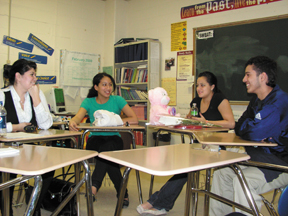A new sex ed class at a local high school has seniors teaching sophomores about the facts of life.
The Teen Prevention Education Program (Teen PEP) at Union City High School North Campus aims to provide students with information to make healthy decisions regarding sex.
“Our main concern is just to get them educated and informed so that then they can make their own decisions.” – Kamaris Loor
________
The program was created by a collaboration among the state Department of Health and Senior Services and two New Jersey non-profits, the Princeton Center for Leadership Training and HiTOPS (Health Interested Teens’ Own Program on Sexuality). Nearly 50 high school statewide participate in Teen PEP.
In Union City, the program includes daily classes for seniors, who learn to prepare skits and lessons for the workshops they hold for sophomores approximately every six weeks.
Sophomores must have parental consent to participate in Teen PEP, and right now, there are nearly 150 of them in the program, led by 21 select seniors and two adult advisors.
Intro event for parents
To give parents a better understanding of what Teen PEP is, the seniors and faculty advisors plan to host an evening event this week.
Teen PEP Family Night will be held on Wed., Feb. 25 at Jose Marti Middle School and is meant to open discussion between the seniors and their parents about sex issues. Though the event is geared toward informing parents, seniors have also invited other family members, teachers, and peers. School and town administrators may also attend.
Faculty member and program advisor Jennifer Hernandez said Family Night will include skits done by the seniors, a panel discussion, and small group activities. Parents will have a chance to talk about how they learned about sex and how their culture changed their view on sex. Some of the discussions will be translated into Spanish.
The program aims to help seniors grow as leaders, while providing students with the information they may need to make healthy decisions regarding sex.
“I am teaching and learning at the same time,” said senior Pablo Varala.
What the sophomores learn
Workshops for sophomores cover a range of topics, including sexually transmitted diseases, unplanned pregnancy, sexual harassment, and date rape. Students also discuss abstinence and ways to be intimate without getting physical.
“We are not preaching to anyone to live by a certain way or don’t have sex or anything; we are just trying to raise awareness,” said senior Diana Leon.
The seniors also help the sophomore role play and work through real-life scenarios about relationships and whether a couple is ready for sex.
“We do spend a lot of time identifying what a healthy relationship is,” said Matthew Rennie, a program advisor. “They do spend a lot of time talking about if you are unable to have a discussion [with your partner] about sex, then you are sure as heck not ready to be doing it.”
The seniors said that in high school, there is a lot of pressure to have sex before college. Leon said that the program helps sophomores understand that they have options.
“They don’t have to feel compelled that they have to do this, or they have to do this,” she said. “They do have choices.”
Loor said that the sophomores ask a lot of questions, and that that is a good sign that they are learning.
“Just the fact that they are asking questions is a great step,” she said.
The sophomores also appear to be more comfortable talking about sex with fellow teens than with adults, said Varala.
Loor agreed and said: “Sometimes it’s hard for teens to talk to their parents.”
Hernandez said that Family Night will help to break down those barriers.
The seniors agreed.
“I don’t think it is going to work overnight, but I think it is going to help,” said Loor.
“We’ll get them thinking,” said Leon.
The advisors said the program may expand next year at the new Union City High School.
“The more kids we can reach, the more kids can get an education about important sexual health topics,” said Hernandez.
Rennie added that in the future, the program may also try to establish a “safe zone” for students who are questioning their sexuality.
Amanda Staab may be reached at astaab@hudsonreporter.com.
